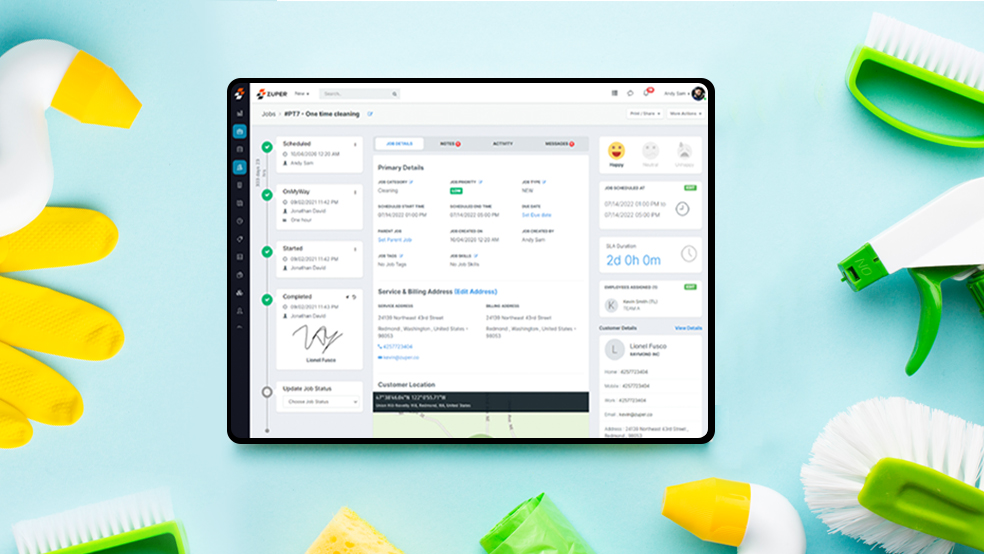Facility management is an ever-evolving industry. From hospitals and schools to factories and office buildings, all facilities require a coordinated effort to run smoothly. Facility management services help ensure that all necessary maintenance activities and repairs are carried out promptly and effectively. Being a facility manager is anything but easy.
Why? Because common facility management challenges have too many moving parts, and relying on outmoded tools won’t get the job done. If you are a facility manager who is trying hard to ensure your processes operate efficiently around the clock, you know how important field service management (FSM) software is.
Ideally, field service management software will create and manage your work orders, keep an eye on your technicians, help you collaborate efficiently with internal stakeholders, and improve your customer service experience. Listed below are some unbeatable benefits a facility management business can enjoy by implementing a field service solution.
Need for Facility Management Software
Now that your facility management business is expanding you have started to notice how inefficient your manual processes actually are. While spreadsheets and online forms are a big improvement over physical paperwork, they have their own set of disadvantages.
Here are the top signs that it is time for your facility management business to consider investing in an FSM software solution:
- You do not have complete visibility of your operations. Your back-office managers have no clue where their service teams are and as a result, have trouble fielding customer questions about ETA.
- Scheduling and dispatching are a nightmare when your field service team’s schedules are stored in overflowing spreadsheets. It can result in an array of scheduling problems ranging from double booking to overlapping jobs.
- Manual estimating and invoicing cause payment collection to take longer than necessary. And, your field service and back-office teams are often left chasing after customers for payments leading to strained relationships.
- You do not stay on top of your asset maintenance plans and often miss PPM schedules. This paves the way for a slew of problems like unscheduled asset downtime, reputational damage, and more.
- Managing sub-contractors and third-party vendors has become a huge ordeal. You are forced to juggle between multiple interfaces to keep them in the loop and track their efficiency and productivity levels.
How Field Service Software Can Optimize Facility Management
1. Track the Status of Jobs
With the GPS-powered field service app, a technician’s exact location and availability for a job can be tracked by facility managers. When a technician is shown as available, the facility manager can easily assign a job based on their skills and location.
Additionally, they can even assign a technician who is already near the customer’s location so that they can ensure faster response time and deliver a better customer service experience. With the help of field service software, tracking the whereabouts of their field service team is easy for facility managers. Additionally, customers can be notified of ETA through SMS or Email.
With remote-timesheet management (RTM) technicians’ lives are made even easier. From the convenience of a mobile app, RTM allows techs to punch in from anywhere—even from a customer’s site—and allows updating jobs in real time.
It is also easier to track how long the technician has been on the job, how much time is left, and the completion status of the job. With the above information, facility managers can plan and schedule the next tasks accordingly.
2. Manage Subcontractors and Third-Party Vendors
The management of subcontractors and the assignment of their tasks cannot be properly coordinated without a field service management system. Integrated field service software allows imports and exports of data and transfers to subcontractors. When facilities managers create work orders and send them to third-party vendors using field service software, subcontractors can easily access job, update job progress, submit quotes, share invoices, and more.
A field service software system can access bids, communicate with subcontractors, and manage all work orders without requiring a separate system. Integrated software provides a streamlined business process for creating invoices, receiving payments, and managing subcontractors and third-party vendors.
3. Help Manage the Asset Inventory
It is important for a facility management firm to manage their assets properly. With facility management software, you can track and manage your business assets efficiently and analyze their performance and health in real time. Field service software can help to manage them throughout their lifecycle, track individual assets by real-time location data, store all asset data in a centralized database, and provide correct access data at all times.
Field service management software can help to track the details of equipment by simply scanning barcodes. Physical assets under the organization are accurately listed. Consequently, the asset tracking module allows businesses to keep track of important asset information, including warranty information and maintenance history. Data like this can be used to manage current inventory and make better decisions like choosing between servicing the asset and discarding it for a new purchase.
4. Automate Work Order Processes
Field service software helps to automate work order processes. With an FSM system, facility managers and teams can remotely view and access the status and details of current jobs. Back-office teams and supervisors no longer need to call technicians every time they have a question. With real-time job status updates, they can retrieve anything from the technician’s ETA to service history easily.
The job dispatch board, allows you to view and access all current work orders. Work orders can be displayed by technician, service location, or who put in the request. By analyzing job history over time, facility managers are able to gain a deeper understanding of the true cost of operating their facility, allowing them to better plan for the future.
With an FSM system, all information is kept in one place allowing quick and efficient searches. However, when using facility management software, you can manage all work orders in one central system where you can easily access any work orders—should changes be necessary. Automated workflows can set up dynamic rules that trigger automated alerts and notifications.
5. Break Down Data Silos
Facility management business operations rely heavily on different systems and workflows. When using different systems for scheduling, dispatching, remote monitoring, and invoicing, it is important that each system be able to share information. Sharing information between systems helps cut down manual interventions and associated errors, making for a smoother experience.
Without information sharing, if you want to exchange data between systems you will be forced to manually export the data from a source system and import it to a target system—a process that will quickly become tedious.
If you are currently using paper or spreadsheets, analyzing activities and trends over time will be difficult for you. What is more, with reports and dashboards FSM software makes it easy to identify high-value clients, best-performing technicians, and your most profitable customers.
Modernizing Your Facility Management Business for Growth
As a facility management business owner today, there are many things you must do to stay competitive and keep your business growing. This is especially true for facility management businesses rely on field service technicians. Field service software not only eliminates redundancies but also optimizes the efficiency of a technician and helps achieve ROI. The top benefits of field service software for your facility management business include:
- Automating your scheduling process helps you save time and ensures that your staff is always working on the most important tasks.
- Automated dispatching helps you send the right staff to the right job at the right time.
- Keeping track of your assets helps save money and ensures that your staff is using the right tools and equipment for the job.
- Automated contract management helps keep track of important information, like deadlines and payments.
- Automated invoicing and estimating help speed up the billing process so you get paid faster.
- Automating your work orders helps reduce errors and speeds up the entire process.
- Real-time alerts and notifications help streamline communication and keep stakeholders in the loop.
Conclusion
To conclude, field service software is a must for any facilities management business. It offers a number of advantages that can help a business in many ways. Field service software can help a business in tracking the status of the job and its availability, reduce time and cost in managing the labor force, help in managing asset inventory, automate work order processes, and provide remote monitoring and control capabilities.
To get to know more about how to run your facility management business, try the ultimate facility management service software from Zuper for effortless facility maintenance.



